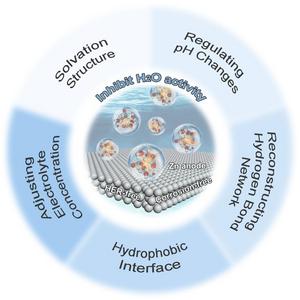In recent developments within the field of energy storage, researchers have been exploring various strategies to enhance the performance of Zinc-based aqueous batteries (ZABs), particularly in terms of regulating water activity through innovative electrolyte engineering. This comprehensive review, published in the esteemed journal SCIENCE CHINA Chemistry, delves into the underlying challenges faced by aqueous zinc-metal batteries and presents cutting-edge solutions to mitigate these issues.
Zinc-metal batteries have gained significant attention in the battery industry due to their potential for high energy density, low cost, and environmental friendliness. However, the performance of these batteries is often compromised by side reactions that occur during the charging and discharging cycles. These unintended reactions can lead to dendrite formation, which shortens battery life and reduces overall efficiency. Consequently, researchers have pinpointed the importance of water activity regulation as a key factor in addressing these issues.
One of the critical problems arising in zinc-metal batteries is the phenomenon of zinc dissolution and re-deposition. When the zinc anode experiences changes in its electrochemical environment, it can lead to uneven plating that contributes to dendrite growth. This not only decreases the structural integrity of the anode but can also result in catastrophic failure of the battery. The authors of the review emphasize that strategic electrolyte engineering can play a transformative role in controlling these processes, thereby minimizing side reactions and improving battery performance.
Recent advancements in the field have introduced various electrolyte additives designed to enhance the stability and longevity of zinc anodes. These include polymer-based additives and ionic liquids, which can effectively modify the electrochemical environment surrounding the zinc anode. The review highlights how these additives can induce a more favorable ion transport mechanism, thereby suppressing the growth of harmful dendrites and promoting smoother zinc plating.
The significance of water activity regulation extends beyond just the zinc anode. In fact, the entire battery system benefits from optimized electrolyte compositions that achieve a delicate balance between conductivity and stability. The researchers illustrate how specific ionic compositions can alter the solubility of zinc salts, directly impacting the availability of zinc ions during the charging process. Their findings suggest that by fine-tuning these parameters, the performance of zinc-metal batteries can be significantly enhanced.
Moreover, the review discusses the various technological innovations making their way into the realm of zinc-based aqueous batteries. For instance, advancements in membrane technology have the potential to improve the selectivity of ion transport, reducing the chances of side reactions. The interplay between membranes and electrolytes is highlighted as a vital area for future research, promising to unlock further improvements in battery efficiency.
Electrolyte engineering is not solely focused on additives and ionic compositions; researchers are also investigating the physical properties of the electrolyte itself. The review outlines how variations in temperature and pressure can influence water activity within the battery. By understanding these parameters, scientists can develop protocols for optimizing electrolyte conditions to create a more conducive environment for zinc plating while dampening unwanted side reactions.
As the landscape of energy storage shifts toward greener solutions, the environmental impact of battery technologies cannot be ignored. The review emphasizes that Zinc-based aqueous batteries present a sustainable alternative to their lithium-ion counterparts. With inherently less harmful materials, ZABs hold strong potential for widespread adoption in various applications ranging from electric vehicles to large-scale energy storage systems.
In the quest for improved battery performance, collaboration and multi-disciplinary approaches are becoming increasingly important. The authors of the review call for partnerships between chemists, materials scientists, and engineers to drive forward the innovations necessary for harnessing the full potential of zinc-based aqueous batteries. This collaborative spirit can pave the way for breakthroughs that will redefine energy storage solutions in the coming decades.
Looking forward, the authors summarize their findings and present a roadmap for future research in the field. They suggest that continued exploration into new materials for electrode development, improved electrolyte formulations, and enhanced understanding of electrochemical mechanisms will be vital for overcoming the challenges currently facing zinc-metal batteries.
In conclusion, the comprehensive review published in SCIENCE CHINA Chemistry serves as an invaluable resource for researchers and industry leaders alike. It underscores the importance of electrolyte engineering in overcoming the critical barriers that hinder the development and commercialization of Zinc-based aqueous batteries. As the world moves towards more sustainable energy solutions, this research could have significant implications for the future of energy storage technologies.
Subject of Research: Strategies for regulating water activity in Zinc-based aqueous batteries through electrolyte engineering
Article Title: Comprehensive Review on Electrolyte Engineering for Zinc-based Aqueous Batteries
News Publication Date: October 2023
Web References: (Not provided)
References: (Not provided)
Image Credits: (Not provided)
Keywords: Zinc-based aqueous batteries, electrolyte engineering, dendrite formation, energy storage, aqueous zinc-metal batteries, side reactions, sustainability, polymer-based additives, interfacial stability, ion transport.




